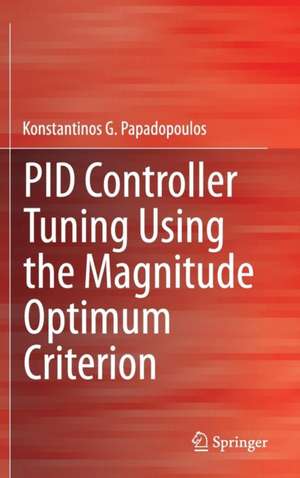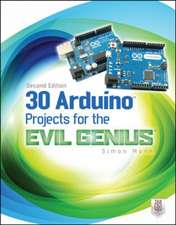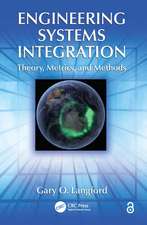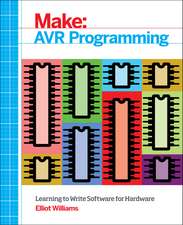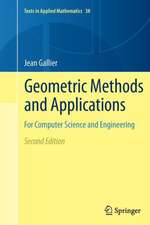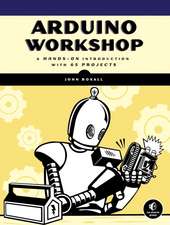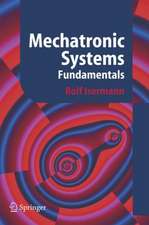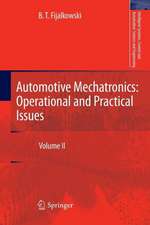PID Controller Tuning Using the Magnitude Optimum Criterion
Autor Konstantinos G. Papadopoulosen Limba Engleză Hardback – 11 noi 2014
This monograph presents explicit PID tuning rules for linear control loops regardless of process complexity. It shows the reader how such loops achieve zero steady-position, velocity, and acceleration errors and are thus able to track fast reference signals. The theoretical development takes place in the frequency domain by introducing a general-transfer-function-known process model and by exploiting the principle of the magnitude optimum criterion. It is paralleled by the presentation of real industrial control loops used in electric motor drives. The application of the proposed tuning rules to a large class of processes shows that irrespective of the complexity of the controlled process the shape of the step and frequency response of the control loop exhibits a specific performance. This specific performance, along with the PID explicit solution, formulates the basis for developing an automatic tuning method for the PID controller parameters which is a problem often met in many industry applications—temperature, pH, and humidity control, ratio control in product blending, and boiler-drum level control, for example. The process of the model is considered unknown and controller parameters are tuned automatically such that the aforementioned performance is achieved. The potential both for the explicit tuning rules and the automatic tuning method is demonstrated using several examples for benchmark process models recurring frequently in many industry applications.
| Toate formatele și edițiile | Preț | Express |
|---|---|---|
| Paperback (1) | 836.57 lei 6-8 săpt. | |
| Springer International Publishing – 23 aug 2016 | 836.57 lei 6-8 săpt. | |
| Hardback (1) | 647.73 lei 6-8 săpt. | |
| Springer International Publishing – 11 noi 2014 | 647.73 lei 6-8 săpt. |
Preț: 647.73 lei
Preț vechi: 762.04 lei
-15% Nou
Puncte Express: 972
Preț estimativ în valută:
123.96€ • 128.94$ • 102.34£
123.96€ • 128.94$ • 102.34£
Carte tipărită la comandă
Livrare economică 15-29 aprilie
Preluare comenzi: 021 569.72.76
Specificații
ISBN-13: 9783319072623
ISBN-10: 3319072625
Pagini: 296
Ilustrații: XX, 296 p. 127 illus.
Dimensiuni: 155 x 235 x 22 mm
Greutate: 0.62 kg
Ediția:2015
Editura: Springer International Publishing
Colecția Springer
Locul publicării:Cham, Switzerland
ISBN-10: 3319072625
Pagini: 296
Ilustrații: XX, 296 p. 127 illus.
Dimensiuni: 155 x 235 x 22 mm
Greutate: 0.62 kg
Ediția:2015
Editura: Springer International Publishing
Colecția Springer
Locul publicării:Cham, Switzerland
Public țintă
ResearchCuprins
Part I Introduction and Preliminaries.- Overview.- Background and Preliminaries.- Part II Explicit Tuning of the PID Controller.- Type I Control Loops.- Type II Control Loops.- Type III Control Loops.- Sampled-Data Systems.- Part III Automatic Tuning of the PID Controller.- Automatic Tuning of PID Regulators for Type I Control Loops.- Changes on the Current State of the Art..
Notă biografică
Dr. Eng. Konstantinos G. Papadopoulos is with ABB Switzerland (Department of Medium Voltage Drives) working as a control software development engineer for the ABB's ACS MV Drives family products. Specifically, control software development is associated with modelling of both induction and synchronous motor drives on a simulation basis, design of the control loops involved within the control principle of the motor, tuning of the involved PI/PID controllers and finally software development/integration of the simulation model onto the ABB's real time platform used in medium voltage drives.
Textul de pe ultima copertă
An instructive reference that will help control researchers and engineers, interested in a variety of industrial processes, to take advantage of a powerful tuning method for the ever-popular PID control paradigm.
This monograph presents explicit PID tuning rules for linear control loops regardless of process complexity. It shows the reader how such loops achieve zero steady-position, velocity, and acceleration errors and are thus able to track fast reference signals. The theoretical development takes place in the frequency domain by introducing a general-transfer-function-known process model and by exploiting the principle of the magnitude optimum criterion. It is paralleled by the presentation of real industrial control loops used in electric motor drives. The application of the proposed tuning rules to a large class of processes shows that irrespective of the complexity of the controlled process the shape of the step and frequency response of the control loop exhibits a specific performance. This specific performance, along with the PID explicit solution, formulates the basis for developing an automatic tuning method for the PID controller parameters which is a problem often met in many industry applications—temperature, pH, and humidity control, ratio control in product blending, and boiler-drum level control, for example. The process of the model is considered unknown and controller parameters are tuned automatically such that the aforementioned performance is achieved. The potential both for the explicit tuning rules and the automatic tuning method is demonstrated using several examples for benchmark process models recurring frequently in many industry applications.
Advances in Industrial Control aims to report and encourage the transfer of technology in control engineering. The rapiddevelopment of control technology has an impact on all areas of the control discipline. The series offers an opportunity for researchers to present an extended exposition of new work in all aspects of industrial control.
aims to report and encourage the transfer of technology in control engineering. The rapid development of control technology has an impact on all areas of the control discipline. The series offers an opportunity for researchers to present an extended exposition of new work in all aspects of industrial control.
This monograph presents explicit PID tuning rules for linear control loops regardless of process complexity. It shows the reader how such loops achieve zero steady-position, velocity, and acceleration errors and are thus able to track fast reference signals. The theoretical development takes place in the frequency domain by introducing a general-transfer-function-known process model and by exploiting the principle of the magnitude optimum criterion. It is paralleled by the presentation of real industrial control loops used in electric motor drives. The application of the proposed tuning rules to a large class of processes shows that irrespective of the complexity of the controlled process the shape of the step and frequency response of the control loop exhibits a specific performance. This specific performance, along with the PID explicit solution, formulates the basis for developing an automatic tuning method for the PID controller parameters which is a problem often met in many industry applications—temperature, pH, and humidity control, ratio control in product blending, and boiler-drum level control, for example. The process of the model is considered unknown and controller parameters are tuned automatically such that the aforementioned performance is achieved. The potential both for the explicit tuning rules and the automatic tuning method is demonstrated using several examples for benchmark process models recurring frequently in many industry applications.
Advances in Industrial Control aims to report and encourage the transfer of technology in control engineering. The rapiddevelopment of control technology has an impact on all areas of the control discipline. The series offers an opportunity for researchers to present an extended exposition of new work in all aspects of industrial control.
aims to report and encourage the transfer of technology in control engineering. The rapid development of control technology has an impact on all areas of the control discipline. The series offers an opportunity for researchers to present an extended exposition of new work in all aspects of industrial control.
Caracteristici
Presents real industrial control loops operating in electric motor drives developing alongside the theoretical ideas Tuning rules cover various types of PID controller and are developed for analog and digital controller designs Theory is developed generally rather than with reference to specific classes of process and its validity then confirmed by simulation in individual systems Tuning rules will help to overcome its technical limitations of PID control – the most popular form of control in the industrial milieu because of low cost and complexity Includes supplementary material: sn.pub/extras
